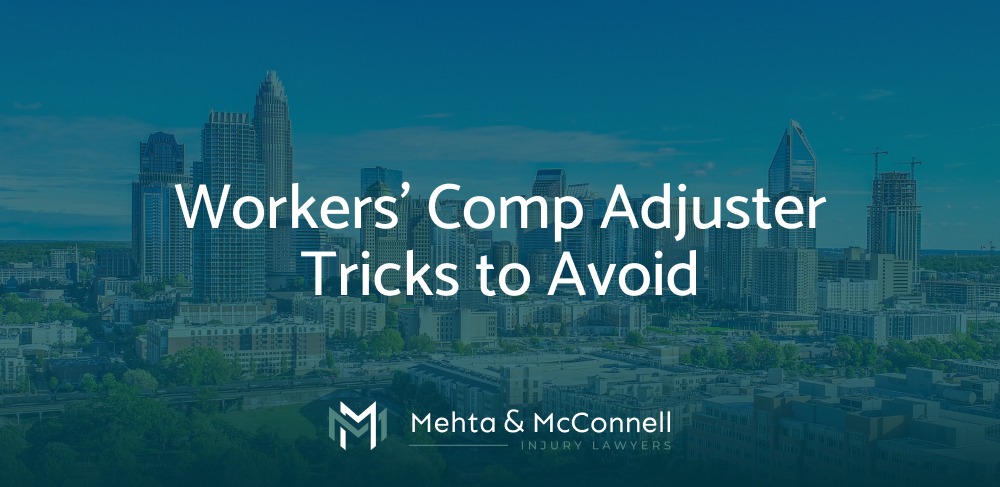
Filing a workers’ compensation claim in North Carolina should ensure you receive the benefits you deserve after an injury. However, insurance adjusters may use tactics to minimize payouts or deny claims altogether. Recognizing these workers’ comp adjuster tricks can help protect your rights and secure fair compensation.
By understanding these strategies, you can avoid common pitfalls that leave injured workers under-compensated. Additionally, seeking professional guidance can ensure the correct handling of your claim.
Workers’ Comp Adjuster Tricks You Should Know
Workers’ compensation adjusters are trained to protect the insurance company’s interests. Understanding their tactics is the first step in protecting your own. Some of the most common tactics include:
- Delaying your claim. Adjusters may intentionally delay the claims process by requesting unnecessary documentation, taking longer to investigate, or failing to return calls promptly. These delays often create financial stress, tempting you to settle for less than your claim’s full value.
- Offering lowball settlements. Quick settlement offers may seem convenient, but they often fail to account for future expenses like ongoing medical care or lost income. Adjusters rely on your immediate need for funds, hoping you will accept an offer before understanding the full extent of your injuries.
- Questioning your injury’s severity. Some adjusters may argue that your injury is not serious and request an independent medical examination (IME) from a doctor chosen by the insurance company. This tactic aims to reduce the perceived value of your claim.
Awareness of these tactics protects your rights and strengthens your claim. Staying informed, documenting everything, and seeking legal advice when necessary can make all the difference in the outcome of your case.
Workers’ Comp Adjuster Settlement Strategies
When negotiating a settlement, adjusters may use specific strategies to limit what you receive. Awareness of the following workers’ comp adjuster settlement strategies ensures you don’t settle for less than you deserve:
- Pushing for a recorded statement. Adjusters might request a recorded statement to “clarify” details about your claim in an attempt to find inconsistencies in your statements. Politely declined to provide any recorded statements without consulting an attorney first.
- Misleading settlement terms. Some adjusters may frame settlement offers as the maximum amount available under your policy. While North Carolina workers’ compensation laws have limits, adjusters often misrepresent these caps to pressure you into accepting an unfair deal.
- Emphasizing time pressure. Adjusters may claim you must accept their offer quickly or risk losing benefits, implying that delays could jeopardize your claim. Take the time to review any settlement carefully, ensuring it reflects the full value of your claim.
Understanding these strategies puts you in a stronger position during settlement discussions.
Workers’ Compensation Claim Adjuster Methods to Watch For
Beyond settlement strategies, adjusters use various methods to gather information and influence the outcome of your claim. Staying vigilant about these workers’ compensation claim adjuster methods can help you avoid common traps.
Monitoring Social Media Activity
Adjusters may review your social media profiles for evidence contradicting your injury claims. Even harmless posts about everyday activities can be misinterpreted.
For example, adjusters can use a photo of you attending a family gathering or engaging in light physical activity to argue that your injuries are not as severe as reported.
To protect your claim, consider avoiding social media entirely during your case. If you must post, ensure that your privacy settings are strict, and avoid discussing anything related to your claim, health, or work.
Contacting Coworkers or Employers
Adjusters might interview colleagues or supervisors to gather information about your work habits or the incident. These conversations can sometimes produce biased or incomplete accounts that hurt your claim.
Adjusters may frame questions in ways that cast doubt on the legitimacy of your injury. Awareness of this tactic allows you to anticipate potential misrepresentations and provide documentation to counter them. Informing your employer about your claim and its validity may help prevent misunderstandings.
Providing Misleading Advice
Some adjusters may discourage you from seeking legal representation by suggesting it’s unnecessary or claiming attorneys complicate the process. They might also downplay the value of your claim or imply that hiring a lawyer will delay your benefits.
Adjusters make these statements to keep you from accessing legal support, which could significantly strengthen your position. Remember, an attorney works for your best interests, ensuring you receive the compensation you deserve.
Sending Excessive Requests for Documentation
Adjusters may overwhelm claimants with requests for unnecessary paperwork, hoping to frustrate or confuse them into making mistakes.
While it’s essential to comply with legitimate requests, you should seek clarification if a request seems excessive or irrelevant.
Consulting with an attorney can help you determine what’s required and prevent unnecessary delays.
Do You Have Questions for an Experienced Workers’ Compensation Attorney?
If you were recently injured on the job and want to learn more about pursuing workers’ compensation benefits, contact Mehta & McConnell, PLLC, for immediate assistance.
At our North Carolina workers’ compensation law firm, we take pride in informing injured workers about their options and helping them obtain the benefits they need and deserve.
Call or connect with us through our secure online contact form to learn more for a free consultation.


